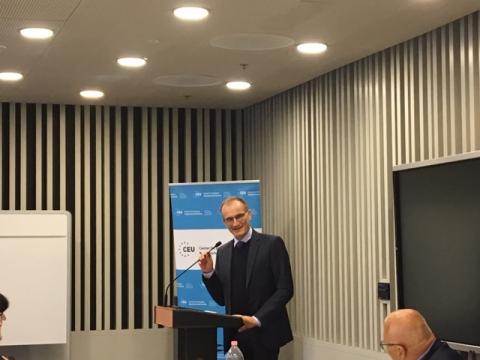Event report - "German Realities”

On Friday, October 19th, the CEU Center for European Neighborhood Studies (CENS) hosted an event entitled “German Realities.” The event featured discussion with the German Ambassador to Hungary, H.E. Mr. Volkmar Wenzel, who elaborated on the current political situation in Germany, and about the outlook for Germany’s future in light of recent and upcoming elections.
The discussion began with an introduction by Péter Balázs, director of CENS at CEU. He highlighted Ambassador Wenzel’s qualifications: thirty-one years in foreign office, with posts at Corfu, Paris, Cairo, and now Budapest.
Ambassador Wenzel first addressed the recent changes within the German parliamentary system. He explained how the two dominant parties within parliament, the CDU and the SPD are being challenged from both left and right; on the left by the LINKE leftists, founded by dissidents from the SPD; and on the right by the AfD, a Eurosceptic and conservative party. The Ambassador specifically addressed concerns about the AfD, and about whether it will gain a larger foothold among voters in the future. He implied that this is possible, but that the party would have to become more mainstream, much like the Green Party, which began as a radical leftist party in 1953, but has moved towards the center, increasing in popularity with voters, and forming a coalition with the CDU last year.
The Ambassador next addressed the recent elections in Germany. He said that in general, elections have been unpopular with voters. The German public has not been happy and does not think the coalition government is working. Yet Wenzel believes that there are other underlying issues concerning the public that have led to their discontent, despite what he sees as a working coalition government. He cites the Bavarian election on October 14th as an example. Both the CSU and the SPD lost votes, whereas the Green Party increased its share by 17.5%, and the CSU lost a fraction of votes to the AfD. Voters either do not support the Christian values of the CSU, or believe answers to their concerns lay elsewhere, such as with the Green Party, which has become popular in many Bavarian cities, and has attracted votes from various age groups. The Ambassador also noted that voters are not primarily concerned with migration as would be expected, but instead are concerned with the high prices of housing, ecology, and education.
This disillusionment with the current political climate in Bavaria could be reflected in the upcoming elections in Hesse on October 28th. The Ambassador stated that support for the CDU and Greens does not promise re-election for their current coalition. Polls showed coalition parties losing 10% of the vote, while the Green Party gained 10%.
The federal elections, however, may be a bit more complicated. The Social Democrats could panic if they see they are losing ground. Wenzel specifically noted that the French Socialist Party, and the Netherlands Social Democratic Party have ceased to exist. Yet, the Ambassador conceded he wasn’t sure yet how the SDs will react to the loss of support--with panic or renewed confidence. The CDs are also facing a dilemma. They are losing votes to the Green Party and the AfD. They may have to adopt some of the AfD’s discourse, but practice in the campaign has shown this has led to a loss of support. Additionally, the CDs will need to find a way to regain votes from the cities, where the Green Party is popular. In addition, the AfD will need to develop a more diversified platform if it is going to attract a wider range of voters.
In the next elections politicians may also need to address another issue of great importance: digitalization. Wenzel claimed that voters believe Germany is lagging behind in the digitization process despite being the third most competitive nation in the world. He believes this is due to a tendency for “German angst,” or a tendency to be cautious about improvements. He stated that this angst is in some ways a strength, a strength to see one’s own weaknesses and keep up with international competition, something which is also good for Europe as a whole.
The Ambassador ended discussion on the topic of German instability. He dispelled concerns that Germany is entering a period of instability, stating that Germany does not believe in strong leaders or crushing majorities in parliament. It has had various coalitions that have worked across states despite this. “We believe in strong institutions, not strong leaders, and not in strong parties.” Thus, what seems like instability within German politics should not be of concern so long as the German institutions remain strong. While Wenzel admitted unease can come from political parties in transition, he reminded the audience that this is the case of politics in democracy in general, so there is no real concern
